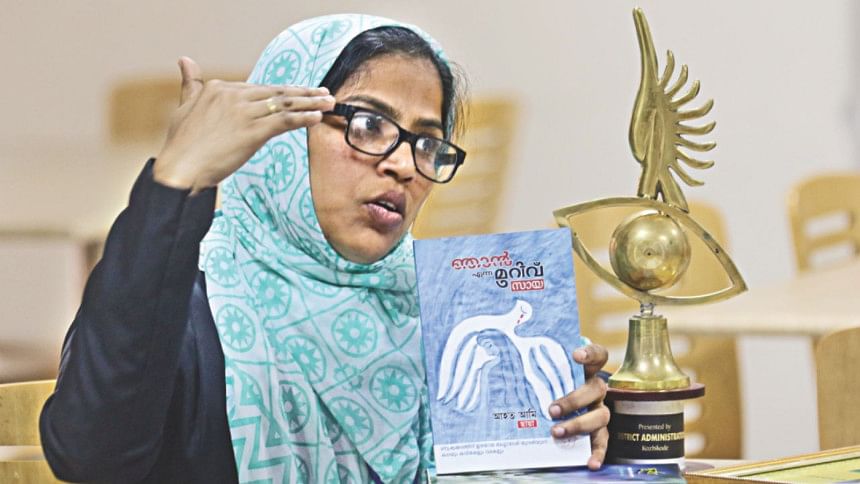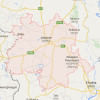Coming back to life

Chhaya (shadow) now wants to come out in the light.
She is the Bangladeshi woman whose poetry collections -- Ahoto Ami (Injured Me) -- was published from India last year after her rescue from a sex racket there. The title was published under the pseudonym, Chhaya.
In real life, she is Ayesha Siddika, 35. She chose to reveal her identity and tell her story in an interview with The Daily Star. Her coming out in the light is her protest against the social exclusion and constant insults she has been facing since her return to Bangladesh in December.
"Since I came back, no one except my three daughters and my mother talks to me properly," she said.
"Other people see me as a fallen woman. My in-laws, my own relatives talk behind my back. Neighbours do not allow their children to play with my daughters.
"But I want to tell everyone that no matter how they treat me, I want to love everyone and work for tortured and abused woman of my country; teach them how to stand on their own two feet and earn a living," said Ayesha, a budding poet and artist.
Born into a poor family in Kachua, Jessore, Ayesha was married off at 12, before she could complete Class eight.
In 2007, Ayesha took tailoring training at the Youth Development Training Centre in Jessore and on completion of her course began working as a trainer at her home. She also started a business of making and selling baby-dresses at her home in Rajarhat, where she lived with her husband and three daughters.
"These work paid for my daughters' education, which was not possible with my husband's earnings," she said.
"I always had this dream of becoming a renowned poet and often tried my hand at poetry," she told this correspondent at The Daily Star office yesterday.
In 2001, then 20, she began to frequent a literary soiree at the Jessore Institute Public Library, where her interactions with noted local poets improved her writing.
Her poems began to appear in a magazine of the institute and one of her poems, Bihangya Nari (Bird Woman), was selected for the 2014 collection edition of the magazine.
"My husband did not like all this, but he never stopped me either. He was indifferent to my talents and wishes," she said.
Last year, the two of them decided to visit India for treatment of a headache that often troubled Ayesha. But when a fight broke out between the couple, Ayesha went to India alone on May 15.
Immediately after crossing the Benapole border, she began to miss her daughters and started crying sitting by a road. It was at this stage that she fell into the hands of traffickers.
"A stranger came and asked me what was wrong," she said, "He talked nicely and consoled me so much that within an hour I ended up telling him all my problems."
The man assured Ayesha of tailoring and beautician jobs in India with much higher pays. He advised her to go to Bonga rail station, where another member of the gang, posing as a relative of the first man, met her.
The second man got on the train with her to go to Shialdah, where she never reached.
"After we crossed Dum Dum, he lit a cigarette and the smell of a gas began to give me a headache and soon I fell into a deep sleep," she said.
When Ayesha woke up, she found herself locked in a bathroom without her luggage, passport, money and mobile phone. She remained a captive there for three days and survived by drinking tap water.
On the fourth day, a couple opened the bathroom door and told her they had bought her as a sex worker.
They blackmailed Ayesha with threats of uploading on the internet the obscene pictures they took of her and telling her daughters about her condition. The physical and mental torture continued for four more days till she gave in.
"When I agreed, they stopped locking me up in the toilet," she said, recounting how she escaped on the eighth day of her captivity, when the residents of that flat in Kerala's Kozhikode were all asleep.
At a nearby hospital, she sought help from a nurse who took her to the police station. From there she was taken to Mahila Mandiram, a shelter home for destitute and trafficked women.
Then started Ayesha's long wait for coming home. "I did not receive any help from Bangladesh government. Probably they did not know. There are so many women like us in many shelter homes in India, perhaps it is not possible for the government to know."
At the shelter centre, she met Anoop Gangadharan, head of a Kerala-based NGO, Arms of Joy, which works for destitute women and children. He heard her story and took initiative to translate into Malayalam and publish the poems she wrote during her stay in Mahila Mandiram.
The NGO also organised an exhibition of pictures painted by Ayesha during her stay at another shelter home Nirbhaya, where she was shifted after she attempted to commit suicide.
"My husband had gone to India in September to bring me back, but when he heard everything he came home alone," she said, recalling the betrayal she felt.
In November, a Kerala court ordered the authorities to send her back to Bangladesh. The order followed her deposition in a case against the sex racket that included the Indian couple and another five men who sexually abused Ayesha during the captivity.
"The collector of Kozhikode using his official jurisdiction arranged for my return in December," she said.
She also expressed her gratitude for the Indian authorities and NGOs for helping her and giving her courage during the “most distressful time” of her life.
Ayesha now wants to publish “Ahoto Ami” in Bangla and another book she is writing on philosophies of life. "If 2,000 copies can be sold in India, as far as I know, won't at least five copies of my book be read by my fellow countrymen?" she asked.

 For all latest news, follow The Daily Star's Google News channel.
For all latest news, follow The Daily Star's Google News channel. 








Comments